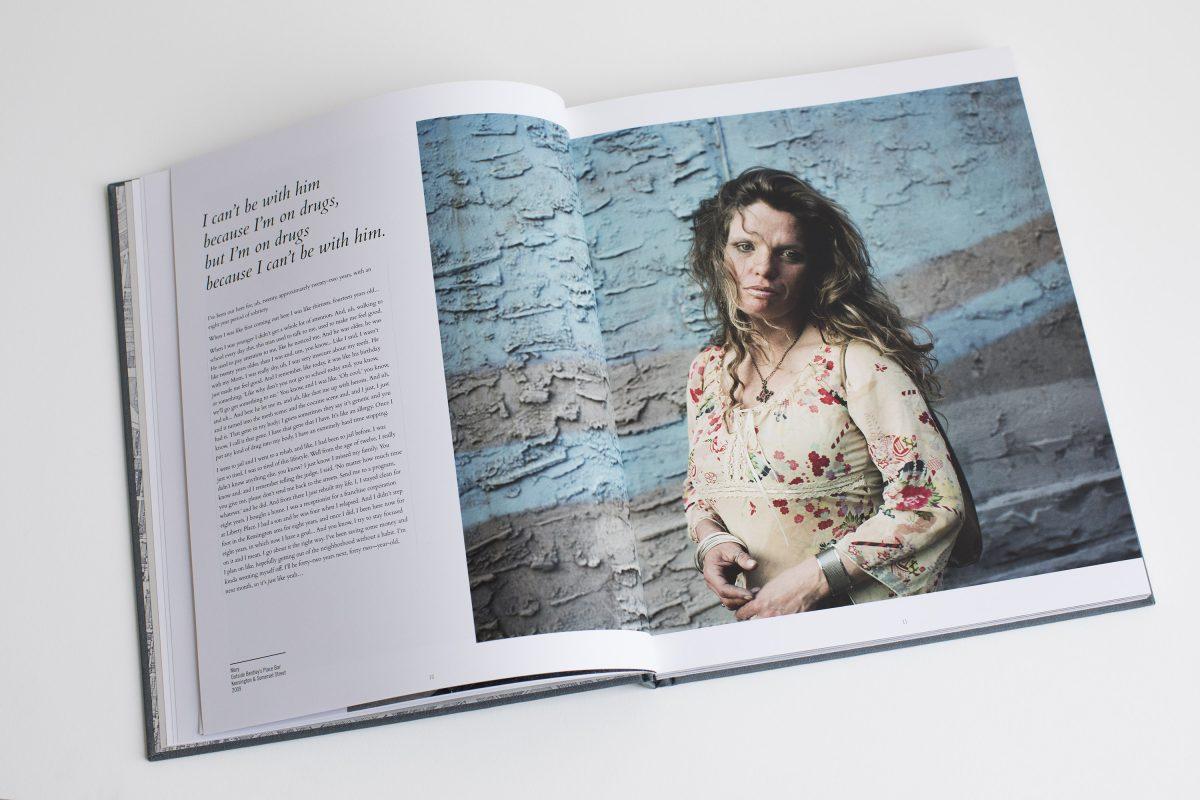Rennie Dugan addresses “elephant in the room” – substance use disorder
Shortly after attending a 12-step meeting in April 2016, Reenie Dugan noticed people running through the streets of the Fishtown neighborhood of Philadelphia where she had grown up.
The neighborhood’s residents, as Dugan discovered, were racing to raise money for Saint Laurentius, a 136-year-old Catholic parish begun by Polish immigrants in the late 19th century. Two years earlier, the Archdiocese of Philadelphia had closed the parish church, stating that it was in danger of collapse. The run participants were going door to door, asking for donations to support the school attached to the shuttered church.
As Dugan watched the runners knock on doors, she found herself focused on the stories of the people inside the homes. Perhaps some of their stories were dark, as hers had once been, marred by the pain of substance abuse.
Seeing the neighborhood’s residents running to keep their parish school alive gave Dugan an idea.
“Maybe we can have a race around the neighborhood to raise money for the opioid epidemic,” she remembers saying to herself.
Six months later, Dugan and other neighborhood residents hosted the first Pink Elephant 5K to raise awareness about the opioid epidemic in Philadelphia and to fight stigmas surrounding drug and alcohol abuse. That race is now an annual event sponsored by The Pink Elephant Movement, a nonprofit Dugan started in January 2017 to provide assistance to children and their families who are impacted by addiction.
As Dugan knew well, substance abuse disorder is the elephant in the room that people see but don’t want to acknowledge. That elephant appears pink, so the saying goes, when the onlookers are drunk or high. It is a color associated with intoxication.
“Everyone wants the perfect family,” Dugan said, “but at the end of the day, this thing is not discriminating against anybody.”
It did not discriminate against Dugan herself.
In 2004, when Dugan was a sophomore on the Chestnut Hill College women’s soccer team, she tore her anterior cruciate ligament or ACL. After surgery to repair it, she was prescribed medication to manage her pain. She took the medication until the bottle was empty and continued to refill the prescription.
By the time her refills ran out, Dugan realized she could not live without the medication.
“It was too late,” Dugan said. “I was already physically hooked and was too afraid to ask for help. It went on for seven years after that.”
In 2007, Dugan dropped out of Chestnut Hill before completing her senior year. Eventually, she became suicidal.
“I just didn’t like the way I felt when I was sober,” Dugan said. “I was at a place where I thought that the only way I was going to find peace was to kill myself,”
In 2011, convinced death was the only way out, Dugan began attending 12-step program meetings to find some solace. Her son had also been born that year, and she wanted to get better for herself, and for him. At one meeting, a woman stood up to share her life story and her battle with substance abuse disorder. Dugan recognized the woman from growing up in Fishtown.
“There’s no way you can be that happy and sober,” Dugan remembered thinking, noting the woman’s energy.
After the meeting, Dugan talked to the woman, opening up about her own drug abuse and her desire to combat it. The woman became Dugan’s pillar of support in her battle against the pills.
In 2014, Dugan finished her degree online at Ashford University and found a job. But she wasn’t yet sober–even though she had convinced herself that she could be any time she wanted. If she was in any type of emotional or physical pain, she turned to drugs to bring her back to a place where she felt good.
But she kept attending meetings. She leaned on her recovery community.
By 2015, Dugan was clean and sober, and she remains in recovery.
Over 400 runners participated in the first annual Pink Elephant 5K on Oct. 1, 2016, including people hoping to make a change in their lives, as well as families and friends affected by a loved one’s substance abuse disorder. They brought photos to the run of people they’d loved and lost. Those photos were framed and displayed throughout the course, a silent reminder of why participants were running.
The run began at Cione Playground in Fishtown. Leaving the playground, participants ran down Lehigh Avenue towards Kensington Avenue. They then turned left down Kensington and headed up towards to Norris Street, making their way to Girard Avenue, then Aramingo Avenue, and finishing back at Cione Playground.
The course has significance for Dugan: Participants run on the same streets where dealers sell drugs. They pass by houses where someone inside fought or continues to fight addiction.
The first race raised “thousands of dollars” — Dugan did not want to specify an amount — that went towards helping the families of those who had lost loved ones to drugs and alcohol and who were struggling to get by. The organization donated money to families during the holidays as well as provided tuition assistance to local elementary and high school students. Last October, around 700 runners participated in the run, with more than 1,000 people in attendance. Again, the money raised went to assist families affected by addiction.
“We are just trying to bring light and joy into people’s lives who’ve kinda been flipped upside down from this nightmare,” Dugan said.
Dugan has lived the nightmare on the other side too. Early in her recovery, Dugan met a 20-year-old woman named Dana Rosney, whose drug of choice had become heroin. The two women became close friends, bonding over their disease. Over time, the women started dating.
Rosney was a gifted soccer player. She had played on her high school varsity team at Little Flower Catholic High School for Girls and eventually the U-17 U.S. National Team. She became a stand-out player on the Manor College Women’s Soccer team.

Beneath her successes on the soccer field, however, a darkness lingered. When Rosney was in grade school, her father had died, a tragedy that marked the beginning of a long spiral into drug abuse. She never graduated from college.
In 2012, Rosney reached out to Dugan after seeing her at a 12-step meeting. Dugan began driving Rosney to meetings after that
“We just had a connection,” Dugan said. “There were times where I was struggling, and she was doing well. Then there were times when she was struggling, and I was doing well. There were times where we had God in our relationship and doing fine. But then she relapsed and wasn’t able to get back.”
It wasn’t easy for Dugan to be with Rosney, though. Dugan loved her, but Rosney’s frequent relapses and drug use were hard on Dugan. Yet Rosney still ran in the first Pink Elephant 5K in 2016, showing her support because she lived on the front lines and knew firsthand the horrors that resulted from substance use disorder.
About two weeks after the run, Dugan and Rosney attended a bingo fundraiser. Dugan said the two had a good time at the fundraiser. Afterward, they went back to Rosney’s house where Rosney broke the news to Dugan that she was using again. Overcome with sadness, Dugan left and told Rosney she needed time to think things over.
Over the next few days, Dugan kept her distance from Rosney, limiting her communication with Rosney so she could think about their relationship.
One afternoon the next week, Dugan was sitting at her desk at work when she received a text from one of Rosney’s friends who was staying in the same recovery house as Rosney. The friend had tried calling Rosney, but Rosney wouldn’t pick up. The door to Rosney’s room, which, according to house rules was supposed to be unlocked, was not. The light in Rosney’s room was on, and her phone could be heard ringing on the other side. There was still no response.
Dugan told the friend she didn’t want to receive any bad news via text, so she went to find a place to call her. Already distraught, Dugan asked her boss to make the call for her.
“He asked them if she was gone,” Dugan said. “He just turned and shook his head at me, and I broke down.”
Residents and staff of the recovery residence on Kensington Avenue found Rosney her room. She had overdosed on heroin. She was dead at the age of 23.
Dugan thinks about Rosney often. In her life prior to sobriety, Dugan would have gotten high to avoid dealing with the sadness and pain of a loved one’s death. Now, though, Dugan said, she doesn’t try to avoid the pain.
“I embrace pain just like I embrace joy,” Dugan said. “Where our hearts are broken, the light goes in.”
Raised in an Irish Catholic household in Fishtown, Dugan said in recovery she has found faith in her own way. God is her “buddy,” who helps her through her struggles.
“I rely heavily on my faith and my relationship with God to keep me going and help me to continue to grow,” she said.
After Rosney’s death, Dugan’s desire to fight her disease is stronger than ever, she said. So is her determination to help others through The Pink Elephant Movement. One of the organization’s goal is to eliminate the shame that keeps members of the community silent in the face of their own, or their loved one’s, substance abuse.
“There’s things going on behind closed doors that people don’t want anyone to know about,” Dugan said. “However, the next door neighbor could be going through the same exact thing.”
When she was a child, Dugan told herself that she would never be the person drifting in and out of consciousness, begging for change on the sidewalk, dependent on drug. For a time, she was. But the person she is now, in recovery, wants to open the public’s eyes to substance abuse disorder, and to the current opioid crisis that plagues so many others in the city.
For Dugan, open eyes mean an open heart. They mean suspending judgment.
“Just because they are making decisions that you wouldn’t make doesn’t necessarily mean that they are not trying their very best,” Dugan said. “I knew I was doing my best before I ever picked up a drug. I knew I was doing my best when I was getting high every day. I knew I was doing my best when I was absolutely crazy and sober. Because that was the best I could do at that time.
“Today, my best looks different.”













































